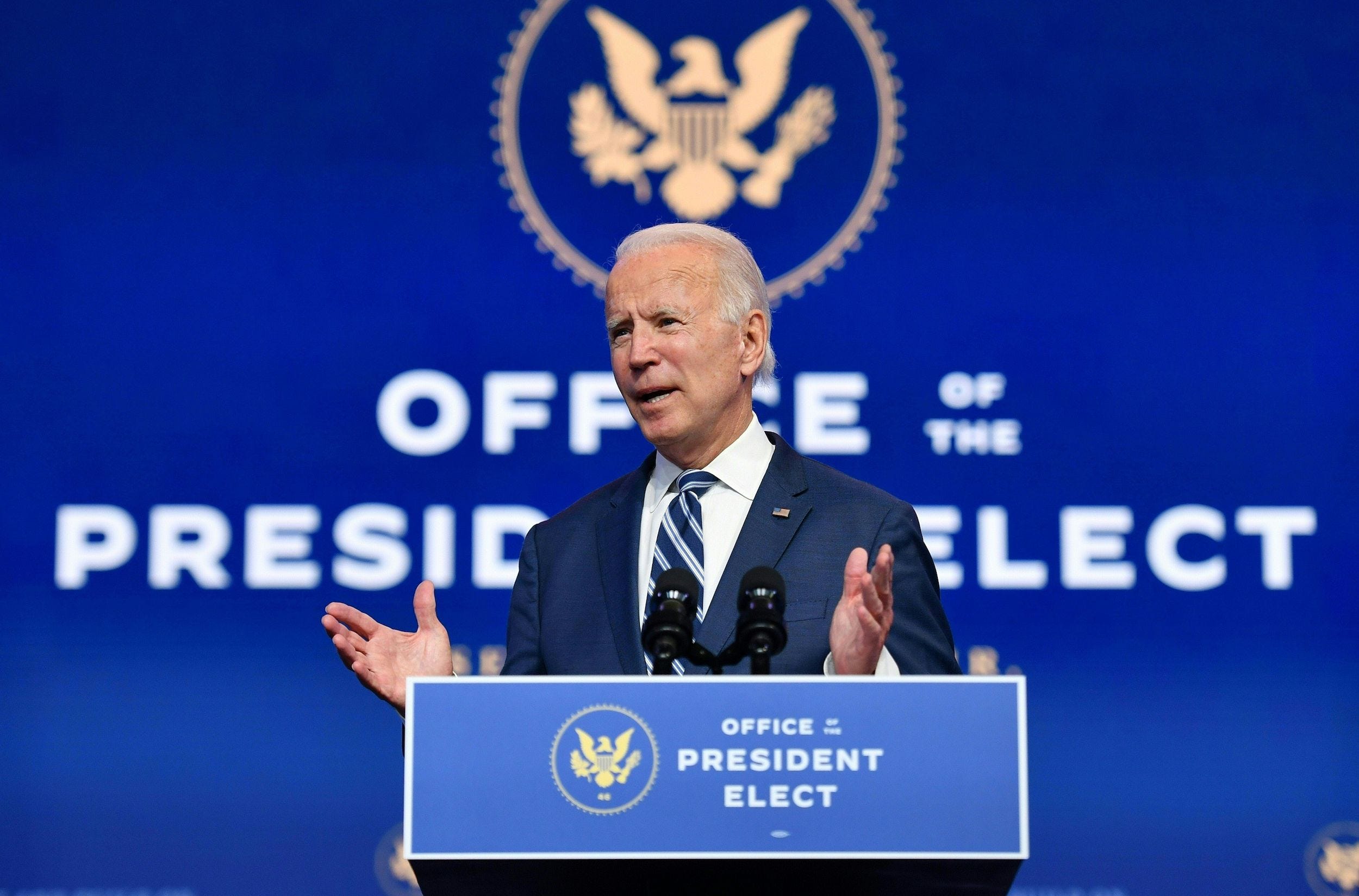
ANGELA WEISS/AFP via Getty Images
- President-elect Joe Biden named the members of his NASA transition team on Tuesday.
- Ellen Stofan, a former NASA chief scientist, will chair the team, which also includes an astrophysicist and a climate researcher.
- Biden will likely push back the timeline of NASA’s Artemis moon mission, extend funding for the International Space Station, and direct more resources back to climate science.
- Visit Business Insider’s homepage for more stories.
President-elect Joe Biden named the members of his transition team for NASA on Tuesday, a key step in determining his administration’s agenda for space exploration.
Ellen Stofan, who currently leads the Smithsonian’s Air and Space Museum, will lead the team. Stofan served as NASA’s chief scientist from 2013 to 2016.
Other members include Jedidah Isler, an astrophysicist at Dartmouth College who studies supermassive black holes; Bhavya Lal, a space-policy strategist who works with the White House Office of Science and Technology Policy; and Waleed Abdalati, another former NASA chief scientist (he served from 2011 to 2012) who’s now at the University of Colorado.

NASA Ames Research Center
Aside from naming his team members, Biden hasn’t yet released details about his plans for NASA. But based on the transition team’s makeup, the Obama administration’s priorities, and the 2020 Democratic Party platform, here are four ways Biden might approach space policy.
NASA will probably re-prioritize climate research
As president, Barack Obama prioritized NASA’s climate change research, funding missions to track planetary warming via satellites. Obama requested over $2 billion in funding for NASA’s Earth Sciences division for the 2017 fiscal year, though the division ultimately received $1.92 billion.
President Donald Trump, by contrast, has consistently requested less funding for the Earth Sciences division than Obama did. The current administration has also said it wants to cut five Earth Sciences missions that mainly focus on climate change research.
Congress has kept existing Earth science programs in place during Trump's presidency but allocated slightly less funding to the division overall. NASA's Earth Science budget for the 2020 fiscal year was $1.78 billion, about $140 million less than in 2017.

NASA Earth Observatory
Biden's administration is likely to attempt to reverse the budget cuts and strengthen Earth science research. The move would align with the 2020 platform of the Democratic Party, which promised to support NASA's "Earth observation missions to better understand how climate change is impacting our home planet."
Biden's transition-team appointment of Abdalati, whose research focuses on using satellites to understand changes to the Earth's ice cover, is another sign of the president-elect's commitment to this issue.
Still, if Republicans maintain control of the Senate, Biden's ability to direct more funding to NASA's Earth Science division could be limited.
Biden may extend funding for the space station

Under Trump, the government was set to stop funding the International Space Station by 2025, then hand control of the orbiting laboratory over to private companies after that.
Biden will likely reverse this decision, according to Reuters. Instead, the president-elect plans to propose a funding extension for the ISS, though it's not yet known for how long.
Continued federal funding of the space station could benefit companies like Boeing, which currently receives $225 million a year from its contract for ISS operations support. Slowing down the timeline could also give companies more time to design and plan for privately run space stations. For instance, Axiom Space, a private aerospace company headquartered in Texas, has a contract with NASA to build its own attachment to the space station.
Once the ISS retires, Axiom's module could theoretically detach to become an independent orbital outpost.
NASA will still aim to land people on the moon, but not as soon
In March 2019, Vice President Mike Pence vowed that the administration would land people back on the moon in 2024.
But that aim has been hampered by funding shortages, since Congress hasn't provided NASA with the $28 billion it asked for to build hardware and train astronauts.
Biden's administration is likely to push the date for a lunar landing back several years – a goal that aligns with the House Science Committee's proposed bill that would aim to land astronauts on the moon by 2028.

NASA/Joel Kowsky
"I don't know anyone who thinks we're going to get there by 2024," Lori Garver, who was a NASA deputy administrator in the Obama administration, told Space News. "No matter who won, this was going to be an impossible goal."
Still, the administration appears to have a lunar landing on its list of priorities. Stofan, the chair of Biden's NASA transition team, helped NASA develop plans for the commercialization of spaceflight as well as human missions to Mars and the moon.
Biden wrote in August that he hopes to lead "a bold space program that will continue to send astronaut heroes to expand our exploration and scientific frontiers."
Continued competition between private spaceflight companies
While Biden and Trump may differ on some priorities for NASA, the president-elect is likely to keep encouraging commercial activity in space – an effort the Obama administration also supported.
According to Reuters, which spoke with officials close to the Biden campaign in late October, the president-elect plans to continue promoting competition between companies like Boeing and SpaceX. NASA's Commercial Crew Program has been funding Boeing and SpaceX to develop astronaut-ready spacecraft to fly to and from the space station. Those contracted missions are almost certain to go ahead.
Still, officials stressed to Reuters that Biden's space agenda was still being formulated and would probably take a backseat to more urgent issues like the coronavirus pandemic and the US economy.
